|
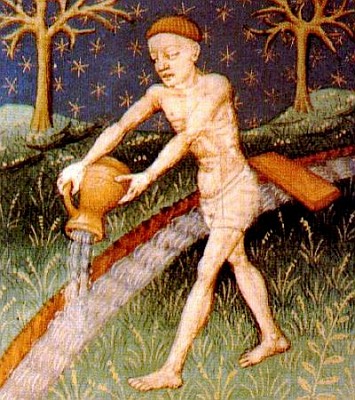
Aquarius rises in the East in the month of August. What else
could Aquarius, the Waterman, symbolize other than Baptism -- the means
by which we become one with Christ as the sign of Capricornus
symbolizes? And what better way to symbolize Baptism than by the man
who baptized Christ Himself -- St. John the Baptist? The
Gospel
according
to St. John the Divine, 1:6-8, describes the Baptist with these words:
"There was a man sent from God, whose name was John. This man
came for a witness, to give testimony of the light, that all men might
believe through him. He was not the light, but was to give testimony of
the light."
There are only three in the History of the world who were born without
original sin, the first, in order of time, being Our Lady; the second
being St. John the Baptist; and the third, Our Lord (Adam and Eve, of
course, started their lives without original sin, but they weren't
born; they were created). This, in itself, tells us of the incredible
dignity that marked the life of the Baptist. The third chapter of the
Gospel according to St. Matthew tells of St. John the Baptist's
ministry:
And in those
days cometh John the Baptist preaching in the desert of Judea.
And saying: Do penance: for the kingdom of heaven is at hand. For
this is he that was spoken of by Isaias the prophet, saying: A voice of
one crying in the desert, Prepare ye the way of the Lord, make straight
his paths. And the same John had his garment of camels' hair, and
a leathern girdle about his loins: and his meat was locusts and wild
honey.
Then went out to him Jerusalem and all Judea, and all the country about
Jordan: And were baptized by him in the Jordan, confessing their sins.
And seeing many of the Pharisees and Sadducees coming to his baptism,
he said to them: Ye brood of vipers, who hath shewed you to flee from
the wrath to come? Bring forth therefore fruit worthy of penance.
And think not to say within yourselves, We have Abraham for our father.
For I tell you that God is able of these stones to raise up children to
Abraham. For now the axe is laid to the root of the trees. Every
tree therefore that doth not yield good fruit, shall be cut down, and
cast into the fire. I indeed baptize you in the water unto penance, but
He that shall come after me, is mightier than I, Whose shoes I am not
worthy to bear; He shall baptize you in the Holy Ghost and fire. Whose
fan is in His hand, and He will thoroughly cleanse His floor and
gather His wheat into the barn; but the chaff He will burn with
unquenchable fire.
Then cometh Jesus from Galilee to the Jordan, unto John, to be baptized
by him. But John stayed him, saying: I ought to be baptized by
Thee, and comest Thou to me?
And Jesus answering, said to him: Suffer it to be so now. For so it
becometh us to fulfill all justice. Then He suffered him.
And Jesus being baptized, forthwith came out of the water: and lo, the
heavens were opened to Him: and He saw the Spirit of God descending as
a dove, and coming upon Him. And behold a voice from heaven, saying:
This is My beloved Son, in Whom I am well pleased.
It is in this month, August, in which Aquarius rises that the
Baptist was murdered by
Herod. The Gospel of St. Matthew 14:1-13:
At the time
Herod the Tetrarch heard the fame of Jesus. And he said to his
servants: This is John the Baptist: he is risen from the dead, and
therefore mighty works shew forth themselves in him. For Herod
had apprehended John and bound him, and put him into prison, because of
Herodias, his brother' s wife. For John said to him: It is not lawful
for thee to have her. And having a mind to put him to death, he feared
the people: because they esteemed him as a prophet.
But on Herod' s birthday, the daughter of Herodias danced before them:
and pleased Herod. Whereupon he promised with an oath, to give her
whatsoever she would ask of him. But she being instructed before by her
mother, said: Give me here in a dish the head of John the Baptist. And
the king was struck sad: yet because of his oath, and for them that sat
with him at table, he commanded it to be given. And he sent, and
beheaded John in the prison. And his head was brought in a dish: and it
was given to the damsel, and she brought it to her mother.
And his disciples came and took the body, and buried it, and came and
told Jesus. Which when Jesus had heard, he retired from thence by boat,
into a desert place apart, and the multitudes having heard of it,
followed him on foot out of the cities.
Decan One: The
Southern Fish
Also appearing in the sky alongside Aquarius is the
constellation known as Piscis Austrinas -- the Southern Fish,
continuing the heavy fish symbolism seen in the sign of Capricornus.
The
Water-Bearer has always been depicted as pouring the water from his urn
into the mouth of the fish, refreshing it with the waters of life (and,
most interesting, this Southern Fish has long been seen as the parent
of the two fish that make up the constellation of Pisces,
which comes next).
Think of that symbolism in light of what
we've already learned about the fish as a symbol for Christians! We are
spiritually nourished by the Baptismal waters poured out first by the
great St. John the Baptist.
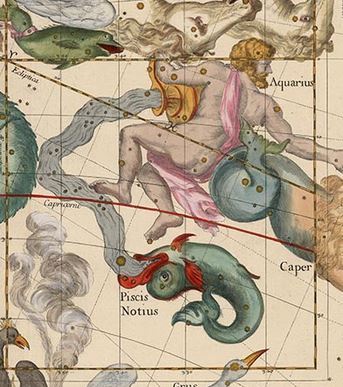
Make note in
this constellation of the thirteenth brightest star of the Northern
hemisphere: Formalhaut, whose name derives from the Arabic fam al-ḥūt -- "The Mouth of
the Whale."
Decan Two: Pegasus
According to Greco-Roman mythology, Pegasus, the beautiful winged
horse, came into being when Perseus slew Medusa. The offspring of
Poseiden, god of the sea, his name comes from the Greek pegai, meaning "waters." He is said
to have struck the ground with his mighty hoof, creating a spring of
waters blessed so that those who drank from it would receive the gift
of poetry. Once more, the idea of life coming from water is seen.
For information's sake, just to the East of Pegasus is the small
constellation Equuleus -- "Little Horse" or "Foal." This constellation
is seen as the brother horse of Pegasus. We can remember this
constellation by remembering that Baptism makes brothers of those who
believe, repent, and receive the Sacraments.
As with Aquila, the second decan of Capricornus, Pegasus was
used by Zeus to carry his thunderbolts.
Decan Three: Cygnus
Also close by is Cygnus, the Swan, also
known as the Northern Cross. Baptism is tied to the Cross, of course,
as Our Lord's Passion, Death, and Resurrection are the source of all
graces.
When Longinus, the Roman soldier who later became a Saint, pierced Our
Lord's side, it was not just Blood, but water which gushed forth. St.
John Chrysostom (b. ca. 347) in his 85th Homily on the Gospel of St.
John wrote of the Wound Our Lord received
in His side:
For "there came
forth water and blood." Not without a purpose, or by chance, did those
founts come forth, but because by means of these two together the
Church consisteth. And the initiated know it, being by water indeed
regenerate, and nourished by the Blood and the Flesh. Hence the
Mysteries take their beginning; that when thou approachest to that
awful cup, thou mayest so approach, as drinking from the very side.
When viewing Cygnus, make note of the fourteenth brightest
Northern star, the
bluish-white beauty known as Deneb. Note, too, that in March of 2022,
plus or minus 6 months or so, two stars in Cygnus known collectively as
KIC 9832227 are predicted to collide with each other, producing a
luminous red nova that should be visible for a month or so.
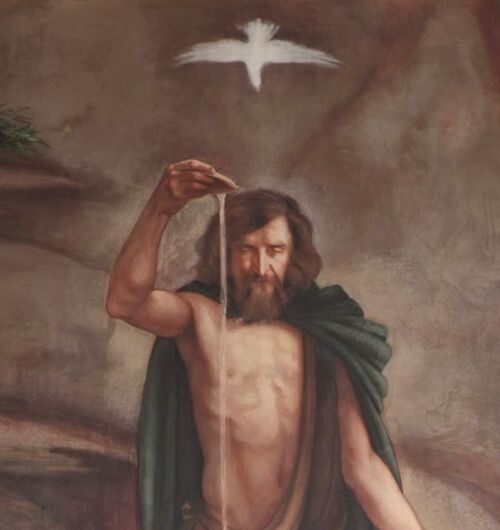
Aquarius can be
seen from August through December.
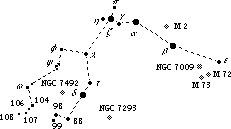
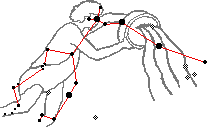
Aquarius
relative to other stars in the Autumn sky:
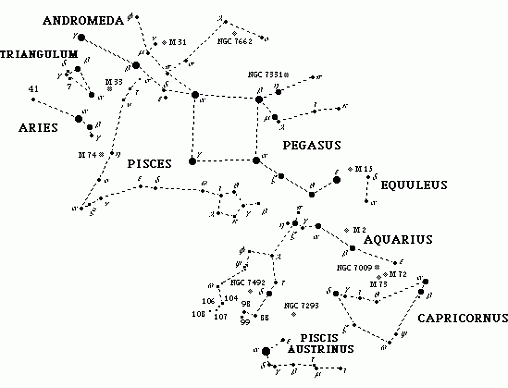
|
|

![]()
